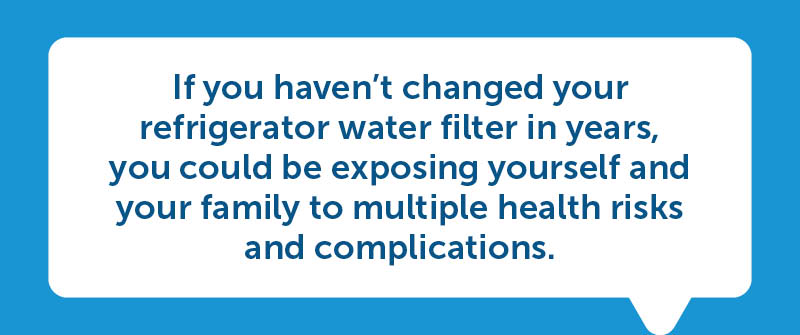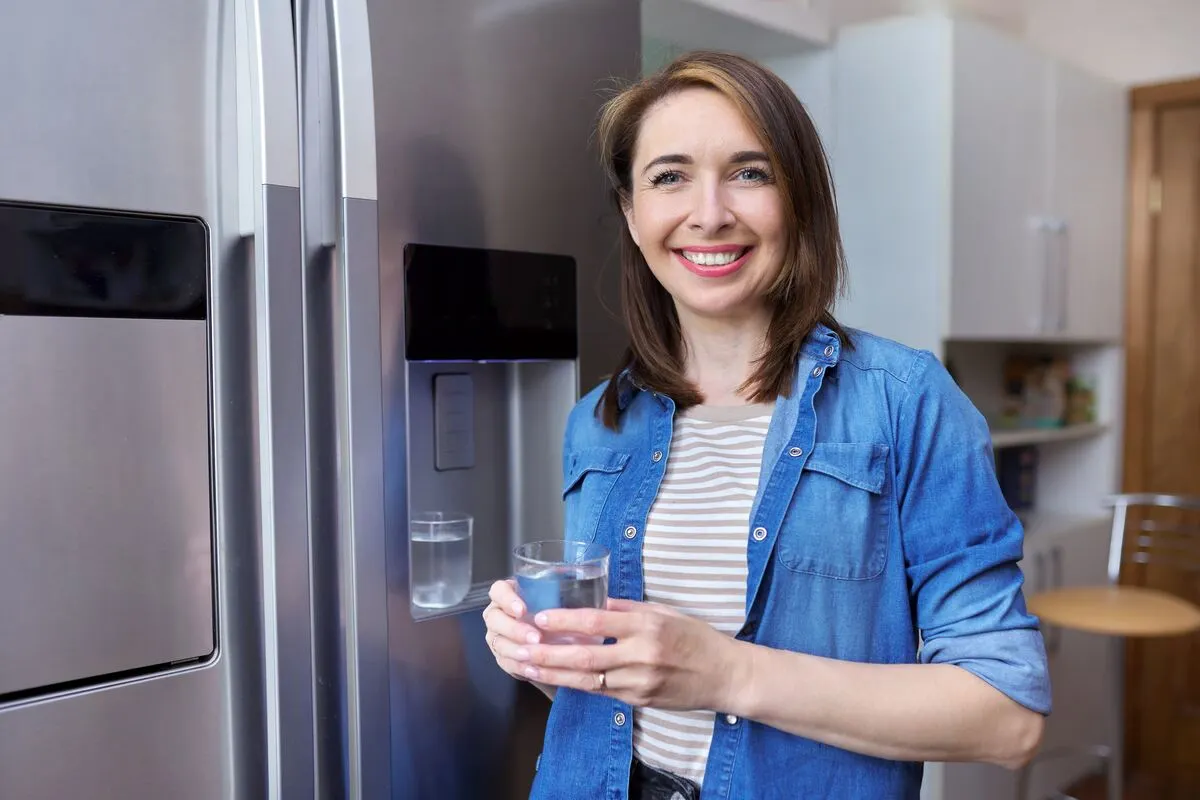Is It Bad To Not Change The Fridge Water Filter?
When you don’t change your fridge’s water filter regularly, numerous issues can arise that may affect both your appliance and your health. Although it might seem unimportant, ignoring this routine maintenance can lead to significant problems.
Importance of Regular Filter Replacement
How to know if your fridge water filter needs to be replaced? It’s really necessary to change your refrigerator water filter every six months. Over time, refrigerator water filters can become clogged with contaminants such as dirt and sediment. A clogged filter will be less effective at removing impurities from your water, leading to possible health risks. Additionally, a clogged filter can overwork your refrigerator’s water system, potentially leading to mechanical issues or failure.
Potential Risks and Hazards of Dirty Filters
What happens if you don’t replace your refrigerator water filter? If you don’t change your water filter, the purity of your drinking water is compromised and the water dispenser may become clogged. A dirty filter can harbor harmful bacteria, mold, and other harmful particulates, which may then be introduced into your water and ice. This can lead to illness and a generally poor taste and smell in your water supply.
Manufacturer Recommendations
Both Whirlpool and Samsung, among other manufacturers, recommend changing your refrigerator’s water filter every six months or after filtering a certain amount of water. Failing to adhere to these guidelines can void your refrigerator’s warranty and reduce its efficiency. Therefore, it’s best to follow the manufacturer’s maintenance schedule to ensure optimal performance and safety.
What Happens If You Drink Water From A Fridge With A Bad Filter?
Drinking water from a fridge with a bad filter can pose several health and maintenance risks. Contaminants that a properly functioning filter would normally remove can accumulate, leading to potential health issues, unpleasant odors, and compromised water quality.
Contaminants and Health Risks
A neglected water filter becomes a breeding ground for bacteria, mold, and other harmful microorganisms. These contaminants can cause various health problems, ranging from mild gastroenteritis to severe respiratory infections. Over time, harmful substances like lead, mercury, pesticides, and chlorine can also pass through an ineffective filter, putting your family’s health at risk.
Taste and Odor Issues
One of the first signs of a compromised filter is the change in the taste and odor of the water or ice machine. A bad filter may fail to remove chlorine and other chemicals, leading to a strong, unpleasant taste and smell. This not only affects the drinking experience but also can reduce the appeal of using fridge water altogether.
Long-term Health Effects of not Regularly Replacing Fridge Filters
Continually consuming contaminated water can have cumulative negative effects on your health. Exposure to certain heavy metals and chemicals over a prolonged period can lead to chronic health issues, including kidney damage, decreased immunity, and even cancer. Changing your filter regularly ensures that you and your family are protected from these long-term health effects.
Find out how to know what is the best brand of fridge water filters.
What Happens If You Haven’t Changed The Fridge Filter In Years?
If you haven’t changed your refrigerator water filter in years, you could be exposing yourself and your family to multiple health risks and complications.

Build-up of Bacteria and Contaminants
Over time, water filters can become saturated with contaminants like chlorine, lead, and sediment. Additionally, if a filter is not replaced regularly, bacteria and mold may start to grow inside the cartridge. These unwanted particles not only compromise the quality of your water but can also lead to serious health issues if ingested over extended periods.
Impact on Refrigerator Performance
A clogged or old filter does not only affect the quality of water but also the overall performance of your refrigerator. A neglected filter can slow down the water flow, making it difficult to dispense water or produce ice efficiently. This could strain the refrigerator’s pump, potentially leading to mechanical failures and costly repairs.
Manufacturer Guidelines and Recommendations
Manufacturers like Whirlpool and Samsung recommend changing your refrigerator water filter every six months to ensure optimal performance and water quality. The NSF (National Sanitation Foundation) encourages people to follow the manufacturer’s recommendations. The Ignoring these guidelines can void your refrigerator’s warranty and reduce its lifespan. Following the manufacturer’s routine maintenance recommendations is key to keeping your appliance running smoothly and safely.
Will The Ice Maker Work Without A Filter?
Refrigerator Filter Bypass Options
Many modern refrigerators, including those from well-known brands like Whirlpool and Samsung, come with an option to bypass the water filter. This is useful if you choose to use an external filtration system or when you do not have an immediate replacement filter available. To bypass the filter, you typically use a filter bypass plug, which is either included with your refrigerator or can be purchased separately.
While bypassing the filter, the refrigerator will still supply water to the ice maker and dispensers directly from the water source. However, it is crucial to ensure that your water supply is clean to prevent any health risks associated with unfiltered water.
Impact on Ice Quality and Production
Using the ice maker without a proper filter can impact the quality and taste of the ice it produces. An efficient water filter removes impurities, contaminants, and chlorine taste from the water before it is frozen into ice cubes. Without a filter, these unwanted elements may remain, resulting in ice that tastes and smells bad.
Furthermore, sediment and particles present in unfiltered water can interfere with the ice maker’s mechanics, potentially leading to clogs and reduced efficiency. Over time, this can affect the production rate and cause the ice maker to work harder than necessary, potentially shortening its lifespan.
Comparison of Ice Makers with and without Filters
Comparing ice makers operating with and without a replacement water filter reveals notable differences. When water filters are utilized, the resulting ice is generally clearer, more palatable, and free from impurities. Filters also protect the internal components of the ice maker from sediment build-up, ensuring smooth operation over time.
In contrast, ice makers without filters can produce cloudy ice with off-tastes and odors, and their mechanisms are prone to wear and tear from contaminants. This is why many manufacturers, including Whirlpool and Samsung, recommend regularly replacing water filters to maintain optimal performance and ice quality.
Choosing the right filter is crucial for extending the life of your appliances and ensuring the best possible ice quality. Take the next step in maintaining your refrigerator’s efficiency and ice maker’s performance by exploring our range of filters. Discover the ideal filter for your needs at Discount Filters, where we offer a comprehensive range of refrigerator water systems, furnace and AC air filters, and so much more.

